John Hurrell – 27 November, 2017
It could be argued that Denny and Byrt in this show are exaggerating the significance of the competitive recreational pursuits of somebody like Thiel (who when younger was an avid Tolkein reader and games enthusiast), that they are over-psychologising him in the name of art, conflating private entertainment with his influential very public theoretical pursuits in an attempt to present a consistently cohesive 'playable' personality.
Living as he does in Berlin, it is quite a while since Simon Denny last presented a project in his hometown of Auckland, especially since his phenomenally successful Secret Power exhibition two years ago in Venice.
In this new, just as cleverly structured, show, he looks at competing world views (community sharing on the ground floor, individual-focussed techno-libertarianism in the basement) as espoused by their champions Max Harris (The New Zealand Project) and Peter Thiel (Zero to One), presenting modified popular board games and paintings—made by Chinese artisans—that were photographed to make the boards and cards necessary for play. A collaboration with journalist and critic Anthony Byrt (who writes the densely informative, occasionally convoluted, elucidatory booklet and contributes some of the ideas) Denny here presents a show that is perfect timing in the age of Ardern and Trump, a show that naturally for him, fixates on digital technology and its interaction with fantasy, be that corporate oneirism or an accurate anticipation of venture capitalism in the future.
The exhibition starts near the gallery entrance with a borrowed ‘game’ work (Acts III) by Michael Parekowhai, Denny’s teacher and mentor when he was a student in Auckland. This Jack Straws set of small scattered bronze tools such as spades, saws, rakes, guns, crutches and ladders (a version of pick-up sticks) emphasises collectivism, while the tapestries on the gallery wall look at the community values promoted in Harris’ The New Zealand Project. One tool props open a coffin-shaped crate containing a prone, life-sized model of Denny—set up for a game of Operation where you can ‘surgically’ remove digital devices such as his iPhone 5, fashion accessories (like his New Era cap) and Bitcoin, ‘indispensible’ items that confuse the osmotic boundaries of the contemporary self.
On this floor there is also an emphasis on the silhouetted ‘universal’ human figure, a motif Denny has taken from iPod and iTunes and Twister marketing. These he has juxtaposed with key point-by-point quotations from Max Harris in Twister-based rugs (Fourth Way Silhouette Wall Weavings), and also literally subtracted in sculptural laser-cut modifications of the vertical stacking game Jenga.
Downstairs we find three other ‘games’ set up with counters, cards and dice positioned on boards shaped as unfolded box-lids. These are mounted on aluminium server casing to double as tables. The preparatory oil paintings—based on biographical research utilising the writings, reading and recreational interests of Peter Thiel and his ideologically linked coterie—were made in Dafen Oil Painting Village in Shenzhen, the same Chinese community that helped Heather Straka produce her exhibition, The Asian, in 2009.
These games are quite varied, and accentuate different types of conflict. In the Lett vault we find a Founders Board Game Display Prototype, constructed out of modified elements from Settlers of Catan. This competition celebrates venture capitalism, and seemingly has a high ratio of science fiction, taking a serious look at the colonisation of the Moon, or Mars, or tax havens in the middle of unterritorialised oceans.
Down in the rear corridor near the back basement window we find an Ascent—Above the Nation State Board Game Display Prototype, where Denny has modified components of Descent—Journeys in the Dark. This work is an elaboration of some of the ideas espoused in the influential book (especially in the Silicon Valley), The Sovereign Individual, written by James Dale Davidson and Lord William Rees-Mogg, two libertarian advocates who with Roger Douglas and others, in the mid-nineties invested in a multi-million dollar Wairarapa sheep station—an event promptly discussed by leftwing economist Bill Rosenberg in Foreign Control Watchdog.
The third board game is Game of Life: Collective vs Individual Board Game Display Prototype, made of modified Das Spiel des Lebens parts, set up at the base of the gallery stairs. Here we find the direct clashing of Thiel and Harris, if you had players taking on those roles and championing all the multi-levelled technological and philosophical symbolism.
It could be argued though that Denny and Byrt in this show are exaggerating the significance of the competitive recreational pursuits of somebody like Thiel (who when younger was an avid Tolkein reader and games enthusiast), that they are over-psychologising him in the name of art, conflating private entertainment with his influential very public theoretical pursuits in an attempt to present a consistently cohesive ‘playable’ personality. Of course art in its very nature is a fictional conceptual elucidation, a made up, imaginative postulation, and so you could counter Denny and Byrt are justified in doing that—that it is intrinsic to making art, that hey: that is what artists do.
So if you allow those liberties, then this is a fascinating exhibition, complicated but ideationally tight. Not only are the exhibits visually riveting and entertaining but the published compendium is a great achievement, packed with a surprising range of information types, albeit densely put together.
Denny and Byrt have also had an exceptional amount of media coverage, a natural consequence of the work not appearing to be rarefied or precious. It is overall basically easy to grasp, and so as a provocative (it might be suggested, highly ambiguous) forum, The Founder’s Paradox deserves—and attracts with its rich layering—an enthusiastic reception from a much wider than usual audience base.
John Hurrell
Recent Comments
Ralph Paine
http://www.metamute.org/editorial/articles/chump-change-decrypting-bitcoin-blockchain
Ralph Paine
Even though the Aotearoa-as-enclave theme seems way redundant this Guardian article is worth reading... https://www.theguardian.com/news/2018/feb/15/why-silicon-valley-billionaires-are-prepping-for-the-apocalypse-in-new-zealand ...but the best thing I’ve ...
John Hurrell
Here is an interesting article on both Thiel and Harris visiting the show. http://www.nzherald.co.nz/business/news/article.cfm?c_id=3&objectid=11956668
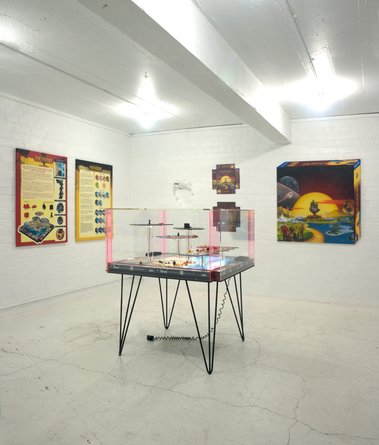
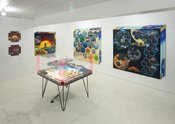
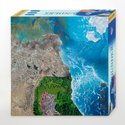
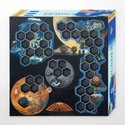
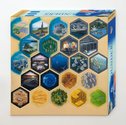

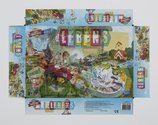

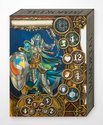

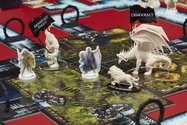




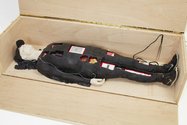
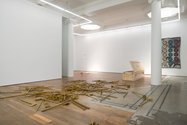
 Two Rooms presents a program of residencies and projects
Two Rooms presents a program of residencies and projects Advertising in this column
Advertising in this column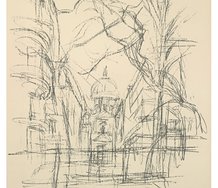
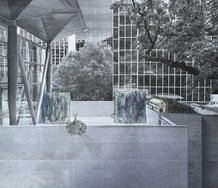
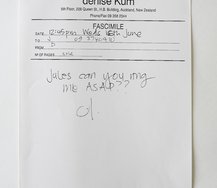
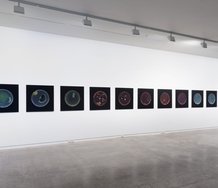
This Discussion has 3 comments.
Comment
John Hurrell, 12:25 p.m. 12 December, 2017 #
Here is an interesting article on both Thiel and Harris visiting the show.
http://www.nzherald.co.nz/business/news/article.cfm?c_id=3&objectid=11956668
Ralph Paine, 3:05 p.m. 23 February, 2018 #
Even though the Aotearoa-as-enclave theme seems way redundant this Guardian article is worth reading...
https://www.theguardian.com/news/2018/feb/15/why-silicon-valley-billionaires-are-prepping-for-the-apocalypse-in-new-zealand
...but the best thing I’ve read about the alt-right this summer is Neoreaction a Basilisk: Essays On and Around the Alt-Right by Philip Sandifer. Dedicated to “the ghosts and the witches” Sandifer’s book is a darkly hilarious, take-no-prisoners account of what passes for ‘thought’ in the venal ‘n’ f_cked-up mindsets of individuals such as Peter Thiel, Eliezer Yudkowsky, Mencius Moldbug, Nick Land, Vox Day, Donald Trump, assorted TERFs (including Angela Nagel), Murray Rothbard & the rest of the cast ‘n’ crew of the Austrian School of Economics (aka neoliberalism, Rogernomics, etc)...
If Denny and Byrt’s project gets a little lost inside the bad abstractions of its rational choice binaries (ironic neutrality vs. commitment, individual vs. collective, art vs. politics, Third Way vs. Fourth Way, paranoia vs. autism, etc.), then to his credit Sandifer conjures up some real monsters (William Blake, Marx, Engels, Erich Fromm, various writers from the Trans Community, et al.) with which to completely obliterate his alt-right enemies.
Funny that of late Byrt is distancing himself from Denny’s insistence on bias-free research (and thus from Denny’s desire to maintain a relationship with Thiel) preferring instead to entrust our future to a Jacinda-mania fuelled version of Max Harris’s Project. Given the savage reality of our present eschaton both stances feel somewhat pathetic. But hey, at least The Founder’s Paradox does teach us that life ain’t no game... Or if it is a game it’s one in which the board rearranges itself and the rules change with every throw of the dice.
Ralph Paine, 5 p.m. 2 March, 2018 #
http://www.metamute.org/editorial/articles/chump-change-decrypting-bitcoin-blockchain
Participate
Register to Participate.
Sign in
Sign in to an existing account.